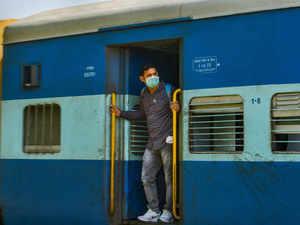
Closed-access railway transit may offer the only practical and humane relief to the migrant workers cast adrift. By Sukanta Chaudhuri
The same scene is being played out across India. Hordes of grim-faced, exhausted men, with a sprinkling of women and children, trudge down hot, dusty highways or throng bus stations and roadside shelters. A bus passes, loaded with 150-200 humans. All are out-of-job migrant workers returning to their villages hundreds of kilometres away.
In the cities they come from, there is often provision for food and shelter. That is no inducement to stay back. They have no money and no hope of earning any. They are worried about their families. Nothing in their lived experience or ancestral memory inspires them to trust the state. For them, Covid-19 is not an overriding threat: just one of a choice of evils, not as vivid as some others, like starvation.
Needless to say, this human flood makes nonsense of the lockdown. Delhi’s Anand Vihar bus terminus saw a crowd of thousands. A crammed bus can be still more infectious.
Clearly, the rules must either be better enforced or else rethought. Enforcement may not be the right, and obvious, choice, it appears. However unaggressive by nature, a half-starved, frustrated crowd might consider it the ultimate betrayal and erupt, possibly with a cascade effect. Humane considerations aside, the last thing India needs just now is a law-and order crisis.
Nor should humane considerations be laid aside. People have already died on the move; the danger will increase as it grows hotter. Police have intercepted container trucks crammed with men. No one knows how many children are at risk: surely, thousands, maybe more. Whatever the legal rights and wrongs, India cannot be seen to fail this large, vulnerable swathe of its people.

Many of the migrants would be travelling anyway — to harvesting work, ensuring them an income and the nation its food supply. Several states need to harvest the rabi crop, and are anxious about labour supply during lockdown. There is talk of phased restoration of certain industries.
State borders have been reopened for all types of goods traffic, necessarily with the humans transporting them. We may, at least, assess the feasibility of some more steps for limited, strictly monitored inter-state movement of people.
The best way to make this viable may be to utilise the railways. India’s entire passenger railway network is under lockdown. The tracks and infrastructure have endless spare capacity, allowing much faster transit than normally. One could reach most points in Bihar from Delhi in 10-12 hours on a non-stop, point-to-point run. Even Thiruvananthapuram to Bihar might be possible in 30 hours. Most crucially, being GoI’s exclusive domain, the railways could provide securely monitored transit. With a small on-board police team, a train can be effectively sealed off without any contact with the hinterland en route, obviating any infection or, indeed, confrontation with locals.
Medical monitoring could be conducted both before boarding and on arrival. The empty terminal complexes at major stations would afford ample space for checks and even quarantine. The railways are converting up to 20,000 coaches into isolation wards, and reserving 50% beds in railway hospitals for Covid-19 patients. The ground is laid for a seamless regime of medical surveillance and treatment for a controlled flow of passengers.
Closed-access railway transit may offer the only practical and humane relief to the migrant workers cast adrift. As Stage 2 of the same strategy, we could think of using this means for mass inter-state labour supply, to harvest crops in the first instance. The Telangana government has already approached Bihar with such a proposal.
What about social distancing? Entry must be controlled. There can be no question of the horrendous crowding still witnessed in time of calamities and festivals. India’s longest passenger train has 24 coaches. The standard second-class coach seats 90-plus passengers.
Without further crowding — no one on the floor, bunks or roof, or clinging to the doors — a 24-coach train could carry some 2,200 people. This would allow reasonably spaced seating, though below Covid-19 norms: the latter would admit some 1,300 passengers per train. Given the entire rolling stock of the Indian Railways, even that should be feasible. This is no time to stint on resources. Any expenditure would be justified if it saved the rabi crop in several states, to look no further.
Human resources cannot be deployed at risk to human life and wellbeing. No compromise is admissible on that score. But we should reflect dispassionately how much compromise is involved in a given proposal, and what human and economic disaster it might prevent. The migrant workers on the road are a major risk to themselves and to others. Any proposal to mitigate that risk demands attention.
(The writer is professor emeritus, Jadavpur University, Kolkata)
Source: indiatimes.com

